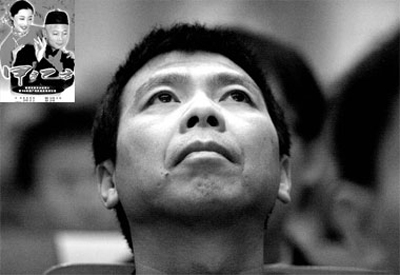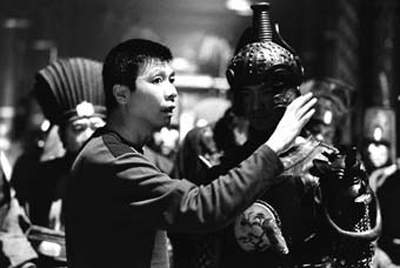Among China's three most powerful directors, Feng Xiaogang is perhaps the only grassroots hero. People often refer to Zhang Yimou and Chen Kaige as masters, but when talking about Feng, they smile as if he is a sweet neighbor who always invites you to share his dumplings.
Strangers will approach Feng and tell him which of his films is their favorite. Such interest in his work shows that while he isn't the most internationally acclaimed Chinese director, he is one of the most popular with Chinese audiences.
His popularity is largely built on hesuipian, a word specially created for his early films screened during December and next February, roughly the time between New Year's Day and the Spring Festival, when people tend to spend more time in cinemas.
Feng's smash comedies on ordinary urbanites' lives topped the domestic box office from 1997 to 99. His films also raked in most money from mainland theaters in 2001 and 2003. In 2006, his first attempt at a costume epic, The Banquet (Ye Yan), won US$19.7 million despite savage reviews.
Feng did not grow up in a film studio, or have a director father as Chen does; neither did he have Zhang's chance to work on a film soon after graduation. The painting-lover from a single-parent family never got a chance to enter any academy, which sets him apart from most mainland directors.
If there is a secret recipe, he says, it is the passion and courage to try. "To me, turning something impossible into possible is really tempting and exciting," says the 49-year-old in black polo shirt with purple logo, blue denim and black sneakers sitting leisurely in the sofa in his lofty studio. While most of his films feature hilarious puns and jokes, Feng is surprisingly serious.
"Every important step is made out of such a belief: I can do it."
At 20, he was determined to join the army's art troupe. Friends thought he was dreaming, but he was accepted as a stage designer with his self-taught oil painting skills.
Eight years later, he left the army and worked at a grain depot. But he chose to shuttle back and forth in different TV drama crews as an art designer, which helped him get a job at the Beijing TV Art Center.
The few years of experience there endowed him with ample opportunities to hone his skills. Everyday he would talk about films and TV dramas with his colleagues, seeking constructive criticism. Such discussions could last for a whole day.
Liu Sha, one of China's earliest TV and film producers, is a 20-year friend of Feng. As he recalls, Feng was always frowning and thinking. The young man always started conversations with jokes, and then talked about a film he watched or a book he just read. What was good about them? Which part could be better?
"He was an avid learner, very smart and hard-working," Liu says. "And he was never afraid to try. Those who also worked as designers then are still designers, but look at him now."
When a screenplay compiled by a group of writers got lost, Feng rewrote half of it with his remarkable memory. When the director felt tired, Feng would boldly ask for a try. He directed two episodes as a result.
Soon the job as an art designer could no longer satisfy him. He started writing scripts and in 1994, he got a bank loan for his maiden work.
"From the very beginning I was shooting film by loan," he says, "which gave me big pressure to perform well at box office, otherwise I could have gone to jail. People who are saying that Feng Xiaogang is more focused on market performance than artistic value don't know the hardships in my early days."
Feng's friend Sun Jianjun says he is like a sponge, always ready to inject anything interesting into his works. Many jokes in his hits come from friends' dining tables.
One of their friends wore false teeth. This friend spent all of his spare time in ballrooms despite his wife's protests. So Liu made up a story to tease him. It goes like this: One day the man has to leave the ballroom in a hurry, but finds his false teeth are gone. He rushes back, only to see his dance partner still dancing with her eyes closed, and his false teeth in her mouth.
Years later, Feng made some slight changes and used this story in Be There or Be Square (Bujian Busan), his second comedy.
Feng and Liu Sha agree that the experience of working on TV serials, which wins audience mostly by storytelling and punch lines, has contributed to Feng's success.
"When I decided to enter the film industry, I knew what people like to watch," Feng says. "Just imagine yourself as an audience, and ask yourself what you want to see."
Everybody seems to know this rule but few have succeeded, "because many directors prefer to win awards rather than the audience", Feng says. "If you think about awards before you start filming, you are already too far away from audience."
But with The Banquet, did Feng forget about his audience? "I am not losing people's favor," he insists. "Banquet made the most money among all my films. If it were so bad, how could it make so much money?"
The project, he says, proves he can handle extravagant budgets and make artistic breakthroughs. "I believe I have achieved these goals, and I am lucky that we didn't lose money, can I expect more?"
Feng has a strong faith in his own logic, which not everyone would support. He once fought with a journalist over a press release, because the magazine leaked his home address and caused lots of troubles to the director.
His latest project, a war epic, called Assembly (Jijie Hao), tells the story of an officer who seeks recognition for his dead soldiers. Feng chose this topic partly because he used to be a soldier himself and partly because war is his own favorite film genre.
Some say he has no self-control, others appreciate his unpretentiousness. But Feng tries to maintain his own direction despite what others think.
"I care about reviews, I believe every director does. Those who care but pretend they don't make me sick," he says. "But compared to critics' or media's response, I care more about my audience, because they decide if I survive or not."
Main movies directed by Feng
2006 The Banquet (Ye Yan)
A loose adaptation of Hamlet, the film is set in an empire in chaos after the Tang Dynasty (AD 618-907). The Emperor, the Empress, the Prince, the Minister and the General all have their own enemies they would like to finish off at a banquet.
2004 A World without Thieves (Tianxia Wuzei)
A thief-couple heads west after cheating a businessman out of his BMW. But an encounter with a naive young carpenter traveling with his life savings challenges their beliefs.
2003 Cell Phone (Shou Ji)
The plot follows a popular television talk show host who accidentally leaves his cell phone at home. When his mistress calls, his wife answers. This sets in motion a series of increasingly tricky situations that threaten his carefully woven web of lies, sending his life spiraling out of control.
2001 Big Shot's Funeral (Da Wan)
Starring Donald Sutherland, the film is set amid the rising commercialism of modern-day China. An American director has a stroke and makes a local cameraman promise that he will produce a "comedy funeral" for him. This turns into a sponsorship feeding frenzy, and the secretly recovering director is tickled pink by the irony of it all.
1998 Be There or Be Square (Bujian Busan)
Two mismatched Beijingers struggling in Los Angeles become reluctant friends after a house invasion. Subsequent coincidences keep forcing the pair together until they can no longer resist each other.
1997 The Dream Factory (Jiafang Yifang)
Four friends come up with an unusual idea to make some money and have fun doing it. For a small fee, they will impersonate and act out any character role for their customers to realize their wishes. In the course of providing this novel service, they encounter a whole spectrum of people, finding ways to genuinely help them boost their morale and overcome their fears.
(China Daily August 22, 2007)



